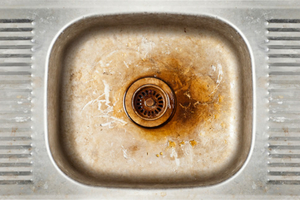
Have you ever stepped into your kitchen or bathroom and noticed a putrid smell? Such rotten odors are usually the result of hydrogen sulfide gas, which is produced by bacteria from contaminated water and sewage. It can make cooking and cleaning your kitchen an unbearable task. However, if there's one good thing about this problem, it's that it is often easy to diagnose and eliminate.
How can you deal with this problem? We've written this article to let homeowners know just how to find the source of these smells and what they can do about it. In some situations, the solution is as easy as disinfecting the troubled area or getting a drain cleaning. Here's what you should know about that stinky sink.
The Water Supply May Be Contaminated
 First, you must determine whether it's your home's water supply or just one drain that's contaminated with bacteria. You can do this with a few simple tests.
First, you must determine whether it's your home's water supply or just one drain that's contaminated with bacteria. You can do this with a few simple tests.
Start by filling a cup with cold water from the awful smelling sink, taking it outside and having a smell. Next, fill another glass with hot water from the same sink, and do the same thing.
Finally, conduct the same pair of tests with water from a different sink in your home. If each glass of water you smelled had a nasty odor, it's likely the water supply is contaminated. If only cups with hot water had the familiar foul smell, the problem rests with the water heater. If none of the glasses of water had a bad smell, it's possible the bacteria exists in one drain.
Homeowners don't need to fear if the problem is with the water supply, as there may be a few solutions. If the source of contamination is your water heater, it may be due to magnesium in the anode rod reacting to the bacteria. That can be fixed by replacing the rod with an aluminum one and disinfecting the water using hydrogen peroxide.
If the cold water is also contaminated, and your water comes from a well, it's possible the pressure tank could be contaminated. Try disinfecting the water by adding bleach, one gallon for every 1,000 gallons of water. Cleaning and sanitizing the well itself may also help. Water softeners are a common source of contamination, and in such cases, you would need to replace the filter.
There Could Be Bacteria in the Drain
 If you find the rotten odor comes from only one sink, a simple drain cleaning might get rid of the smell. Bacterium grows in your drain because debris, like food and hair, clings to the pipes, and then they begin to rot.
If you find the rotten odor comes from only one sink, a simple drain cleaning might get rid of the smell. Bacterium grows in your drain because debris, like food and hair, clings to the pipes, and then they begin to rot.
Pouring a half cup of bleach down the drain should do the trick. As a natural alternative, you can instead pour a half cup of baking soda, followed by a cup of white vinegar down the sink, and let the combination fizz for a while before flushing it away with warm water.
What Happens Now?
If all of these solutions aren't working and the problem is still plaguing your kitchen or bathroom, you should contact an Arlington Heights, IL professional plumbing company.
They will have the equipment and materials to find and address the underlying issue; they can decontaminate your water supply or conduct drain cleaning services.




